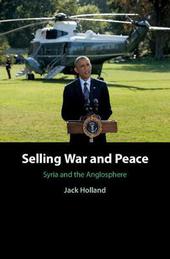
|
Selling War and Peace: Syria and the Anglosphere
Hardback
Main Details
| Title |
Selling War and Peace: Syria and the Anglosphere
|
| Authors and Contributors |
By (author) Jack Holland
|
| Physical Properties |
| Format:Hardback | | Pages:302 | | Dimensions(mm): Height 234,Width 159 |
|
| ISBN/Barcode |
9781108489249
|
| Classifications | Dewey:327.5691017521 |
|---|
| Audience | | Professional & Vocational | |
|---|
| Illustrations |
Worked examples or Exercises; 1 Tables, black and white
|
|
Publishing Details |
| Publisher |
Cambridge University Press
|
| Imprint |
Cambridge University Press
|
| Publication Date |
7 May 2020 |
| Publication Country |
United Kingdom
|
Description
By analysing Anglosphere foreign policy debates during the Syrian Civil War from 2011 to 2019, this book is a significant contribution to the literature in three fields. First, the book analyses the entirety of the Syrian Civil War in an innovative four-phase chronology, as the conflict evolved from calls for democracy, through chemical weapons concerns, to the rise of ISIL and the onset of Great Power proxy war. Second, the book maps and theorises Anglosphere foreign policy, charting the history and future of the US-UK-Australian military alliance during a key period of political uncertainty, defined by Donald Trump's presidency and the UK's Brexit negotiations. Third, the book develops a post-constructivist framework for the analysis of transnational political debates which determine war and peace in Syria and beyond. This framework emphasises the hard nature of soft power and the coercion of political opponents through forceful words.
Author Biography
Jack Holland is Associate Professor in International Security at the University of Leeds. He is the author of Selling the War on Terror: Foreign Policy Discourses after 9/11 (2012) and co-author of Security: A Critical Introduction (2014). He is also co-editor of Obama's Foreign Policy: Ending the War on Terror (2013) and The Obama Doctrine: A Legacy of Continuity in Foreign Policy? (2016). Alongside these books, he has published in journals such as European Journal of International Relations, International Political Sociology and Review of International Studies.
Reviews'This meticulous exploration of the construction and selling of the Syrian crisis will be urgent reading for analysts and students of international security. The confidence with which Holland charts the rise and fall of discourses on democracy promotion, chemical weapons prohibition, ISIL, and proxy war offers enviable evidence of an author in complete command of his archive. His attention to the role of the Anglosphere, moreover, poses a provocative and significant theoretical challenge to familiar state-centric models of world politics. Holland's analysis - from the tragic, haunting, opening pages onwards - will stay with his readers for a very long term: deservedly so.' Lee Jarvis, University of East Anglia 'In this topical and important book, Holland provides us with compelling insights into both the acutely complex nature of the war in Syria and the decision-making - and selling - of foreign policy among the Anglosphere states of the USA, UK and Australia. Drawing on a sophisticated conceptual framework he points to the construction of the war in Syrian between and within these states, in the process illuminating the key contours of foreign policy discourse in the Anglosphere.' Matt McDonald, University of Queensland 'This book develops an alternative way of understanding the outcome of the Syrian Civil War as a contest of ideas within 'the old Anglosphere coalition' of Australia, the UK and the US. In doing so, it gives substance to the view that we need to break with the habit of analyzing foreign policy discourse exclusively in national terms. Readers are bound to be provoked by its analytical themes and conclusions.' Srdjan Vucetic, University of Ottawa, and the author of The Anglosphere: A Genealogy 'If you want to make sense of the West's seemingly heartless and erratic response to the horrors of the Syrian civil war, look no further than this book. The author provides a theoretically sophisticated, empirically meticulous, clear and incisive analysis of this most distressing of contemporary conflicts, and the role of the Anglosphere Coalition in the perpetuation of insecurity in the Middle East. In fact, if you want to understand war and peace in the world today, start here. A brilliant piece of IR scholarship, and a major contribution to critical constructivism.' Richard Jackson, University of Otago
|